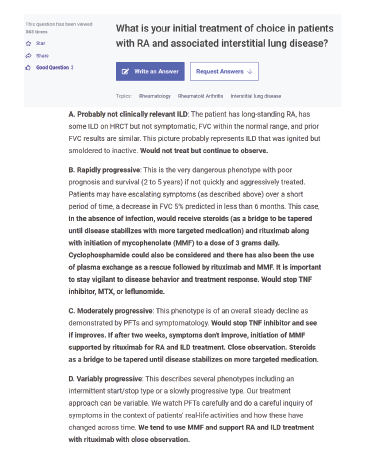
optimarc / shutterstock.com
A clinical conundrum that rheumatologists often face is making a diagnostic or therapeutic decision in the absence of evidence-based data to guide clinical decision making. MedNet is a digital community of physicians created to improve knowledge sharing among physicians and help ensure patients get the highest quality care. The goal of the platform, according to the MedNet website (themednet.org), is to “help physicians get answers to questions where there is no clear answer in guidelines or published research and expert opinion is necessary.” Answers on the website are indexed and searchable.
The platform was originally developed and co-founded by siblings Nadine Housri, MD, and Samir Housri, and launched in the field of oncology in 2014. As the inaugural rheumatology deputy editor, Sarah Fantus, MD, assistant professor of medicine and rheumatology, and associate program director at Northwestern University Feinberg School of Medicine, Chicago, launched the rheumatology subsection of MedNet in 2020.
Dr. Fantus explains the original idea was conceived after Nadine and Samir’s father was being treated for cancer but did not have access to experts to help answer advanced questions for his care. As a radiation oncology trainee, Dr. Housri accessed her personal network and sought experts to answer questions about her father’s care. The idea was born to increase access to national experts who do research and are subspecialists in niche fields and help improve the care of patients nationwide.
Expanding MedNet to Rheumatology

Dr. Fantus
After success in the areas of hematology and oncology, Dr. Fantus says rheumatology was the first field they expanded to. “Rheumatology is a specialty where many of our decisions are based on clinical experience and expert opinion because we do not have an excellent evidence base to guide us for a lot of the conditions we treat. This is a great way to disseminate expert opinion more widely and encourage discussion and debate on issues we encounter every day in the clinic.”
With biologics and other new drug approvals released every few months, treatments often rapidly outpace guidelines. This type of platform offers a unique avenue to share cutting-edge research and find consensus on tough clinical questions.
What Is MedNet?

Figure 1: MedNet Question & Responses
MedNet is a question-and-answer platform available as a physician-only site. Registration is required, and an individual’s identity as a practicing physician is confirmed before they can ask a question on the platform, Dr. Fantus explains. The question is sent to a team of physician editors who ensure no patient-specific information is revealed, and then they send the questions to specific experts who answer by posting a response on the site.
“We often acknowledge that there is more than one answer to a question,” notes Dr. Fantus. Having multiple experts answer the same question is encouraged to provide perspective. “The questions and answers are searchable, so people can have access [long] after they are posted and answered.”
As of March 2022, the rheumatology community had grown to 1,375 physician members, and more than 170 practicing rheumatologists or rheumatology fellows had asked a question; 367 rheumatology questions have been answered on the site, with more than 58,000 total views.
An example of a popular question on the rheumatology MedNet platform is: “What is your initial treatment of choice in patients with RA and associated interstitial lung disease?” The question and response, plus other MedNet user comments, can be viewed after registering. See an excerpt of the response in Figure 1.
Utility for Fellows & Early Faculty

Dr. Lockwood
Megan Lockwood, MD, assistant professor of medicine at Georgetown University Hospital, Washington, D.C., and MedNet associate editor, completed her fellowship in rheumatology at Massachusetts General Hospital, Boston. “Having a forum with a virtual community of colleagues to elicit expert opinions has been incredibly helpful, especially for some of the nuanced clinical situations we find ourselves in rheumatology without clear evidence to guide us,” Dr. Lockwood says.
She also notes the benefits of using the platform as a rheumatology trainee and now a junior faculty member. “It is interesting to learn about how varied practice patterns are at different institutions,” she says. “This resource has been helpful for me to determine and shape what my practice style is going to be and dive deep into the rationale behind clinical decisions.”
Dr. Fantus notes she recruits experts who have worked on national guidelines, been published in major journals and speak at national rheumatology meetings. Recruited experts who agree to participate are added to the expert list and answer up to two questions per month on specific topics.
“If a question is about myositis-associated ILD [interstitial lung disease], we find an expert most appropriate to answer it,” Dr. Fantus says. The editorial team reviews posted answers to ensure the content is appropriate, accurate and the primary literature is cited correctly.
As associate editor, Dr. Lockwood says, “Clinical scenarios or questions where answers cannot be found in textbooks or guidelines are perfect opportunities for questions to be posted on MedNet.”
A plethora of experts in rheumatology have joined the MedNet platform. When asked why such a positive response has been seen, Dr. Fantus explains a large need exists for what the platform provides. “People are excited about being able to ask their questions [of] a broad rheumatology audience. Experts are excited to give their time and share their expertise, and to get their opinions out to other rheumatologists.” Ultimately, this bidirectional relationship allows for exchange of ideas, thoughts and information among the rheumatology community.
Future Directions
As the MedNet platform grows, Dr. Fantus has several ideas regarding future initiatives for the platform: “We are working with both Arthritis & Rheumatology and the The New England Journal of Medicine (NEJM) to make articles available for free and connect us with primary authors to answer questions from the community,” she says.
A MedNet rheumatology journal club featured the February 2021 NEJM article on the ADVOCATE trial on avacopan for the treatment of anti-neutrophil cytoplasmic antibody-associated vasculitis, with author Peter A. Merkel, MD, MPH, chief of rheumatology and professor of medicine and epidemiology, University of Pennsylvania, Philadelphia.
Another initiative being planned is a multispecialty, interinstitutional case conference, in which several academic institutions and their respective faculty will discuss interesting, challenging cases with specific diagnostic or management questions.
Dr. Lockwood says she is thrilled about MedNet, which has created a novel, virtual experience of being able to curbside an expert from a large community of colleagues and elicit expert opinions on emerging treatments. “Rheumatology is an art as much as a science, particularly in our field with a paucity of high-level data and the rarity of our diseases,” says Dr. Lockwood; “we have so much to learn from our colleagues at different institutions from around the country. MedNet is an opportunity for people to share experiential knowledge, engage in open discussions about clinical management on tough cases, and query experts on opinions about emerging treatments in rheumatology.”

Dr. Maheswaranathan
Mithu Maheswaranathan, MD, completed his fellowship in rheumatology at Duke University, Durham, N.C., where he is currently an attending rheumatologist in his first year on faculty.


